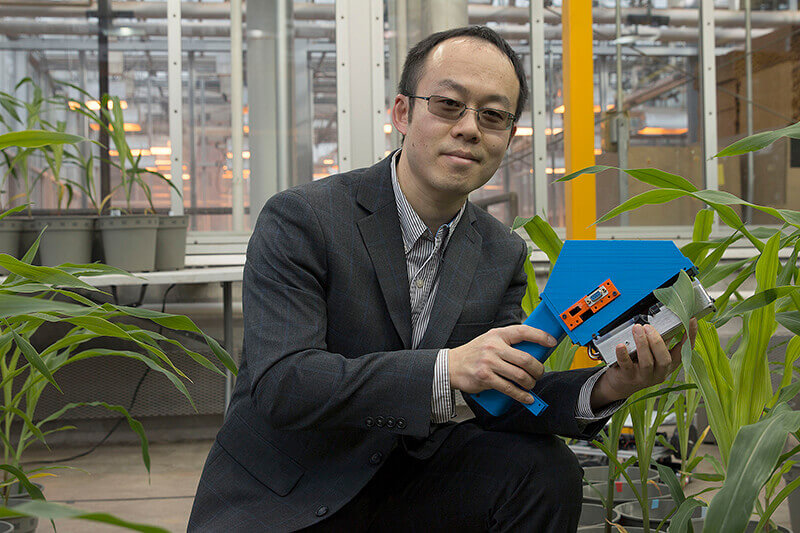January 22, 2019
Three Purdue University researchers advance innovations through $100,000-plus in funding
 Jian Jin, an assistant professor in Purdue’s Department of Agricultural and Biological Engineering, who was awarded $50,000 from the Trask Innovation Fund to further develop an innovative handheld sensor that gives plant scientists and farmers a more precise way of measuring the health of crops. Three Purdue researchers were awarded a total of $121,000 to help commercialize their innovations through the Office of Technology Commercialization. (Purdue Research Foundation image/Hope Sale)
Download image
Jian Jin, an assistant professor in Purdue’s Department of Agricultural and Biological Engineering, who was awarded $50,000 from the Trask Innovation Fund to further develop an innovative handheld sensor that gives plant scientists and farmers a more precise way of measuring the health of crops. Three Purdue researchers were awarded a total of $121,000 to help commercialize their innovations through the Office of Technology Commercialization. (Purdue Research Foundation image/Hope Sale)
Download image
WEST LAFAYETTE, Ind. – Three Purdue University researchers have received a total of $121,000 from the Trask Innovation Fund to further develop their technologies and move them through the commercialization pipeline.
The technologies include an alternative to lithium-ion batteries, an innovative handheld sensor that gives plant scientists and farmers a more precise way of measuring the health of crops and a way for consumers to choose a health care provider without revealing sensitive information.
“There were a lot of novel and worthy technologies submitted by researchers. It’s a clear indication of the variety of global challenges Purdue researchers are taking on and the potential impacts these innovations can have,” said Abhijit Karve, senior business development manager for the Purdue Office of Technology Commercialization.
The Trask Innovation Fund makes funding available twice a year to assist
Purdue faculty and staff on their developments that are commercialized through the Office of Technology Commercialization. The Purdue Research Foundation managed fund is an endowed development fund designed to support short-term research and development projects that can enhance the commercial value of Purdue intellectual property.
Purdue researchers receiving the funding are:
• Vilas Pol, a Purdue associate professor in the Davidson School of Chemical Engineering, who was awarded $50,000 to continue research on a sodium-ion battery that would be an alternative to lithium-ion batteries made up of rare lithium. Other sodium-ion batteries have struggled with sodium ions sticking to the hard carbon end of a battery, called an anode, during the initial charging cycles. Pols’ team has devised a sodium powder version that fixes that problem. A news release on the innovation is available here.
• Jian Jin, an assistant professor in Purdue’s Department of Agricultural and Biological Engineering, who was awarded $50,000 to further develop a handheld sensor that uses hyperspectral-imaging to scan a plant for physiological features, such as moisture, nutrient and chlorophyll levels, as well as different chemical spraying effects and disease symptoms to determine whether it is healthy or under stress. The sensor gathers up-to-the-minute data that users will find valuable. A news release on the sensor is available here. A video on the sensor is available here.
• Mohammad Rahman, an associate professor in the Krannert School of Management was awarded $21,218 to further develop a scalable platform that enables enterprises to perform real-time computations across private ledgers without needing to disclose confidential information in the ledgers to anyone, including the platform.
These innovations align with Purdue's Giant Leaps, celebrating the global advancements in made in health, space, artificial intelligence and sustainability highlights as part of Purdue’s 150th anniversary. Those are the four themes of the yearlong celebration’s Ideas Festival, designed to showcase Purdue as an intellectual center solving real-world issues.
The Purdue Research Foundation is making changes to the Trask Innovation Fund starting this semester to put more emphasis on technologies showing the most promise of having an impact and adding a third track to its format. The foundation’s Office of Technology Commercialization made the changes to further boost the impact of Purdue-affiliated technologies and support the market potential of those innovations.
The new format categorizes the Trask Innovation Fund in three divisions:
• Innovation Sparks: Life Sciences. Technologies with applications in life sciences including therapeutics, diagnostics, medical devices and agriculture.
• Innovation Sparks: Physical Sciences. Technologies with applications in physics, chemistry and engineering.
• Entrepreneurship Sparks. Technologies for which researchers are on path to create a startup (pre-startups) or technologies for which OTC has already executed an option with a Purdue or a non-Purdue startup.
Proposals are due in February and September each year. Interested researchers can learn more here. The fund’s objective is to support short-term projects that will enhance commercial value of Purdue intellectual property assets. Financial support is designed to provide an individual technology portfolio up to $50,000 for a period of six months. Inventors should work with their Sponsored Program Services Pre-Award Center for preparation of submission by Pre-Award Staff to the Office of Technology Commercialization.
Funding is provided to Purdue researchers to perform proof-of-concept work, compile critical commercial relevant data or develop working prototypes. The fund does not support basic research.
About Purdue Office of Technology Commercialization
The Purdue Office of Technology Commercialization operates one of the most comprehensive technology transfer programs among leading research universities in the U.S. Services provided by this office support the economic development initiatives of Purdue University and benefit the university's academic activities. The office is managed by the Purdue Research Foundation, which received the 2016 Innovation and Economic Prosperity Universities Award for Innovation from the Association of Public and Land-grant Universities. For more information about funding and investment opportunities in startups based on a Purdue innovation, contact the Purdue Foundry at foundry@prf.org. For more information on licensing a Purdue innovation, contact the Office of Technology Commercialization at otcip@prf.org.
Writer: Tom Coyne, 765-588-1044, tjcoyne@prf.org
Source: Abhijit Karve, 765-588-3487, aakarve@prf.org

